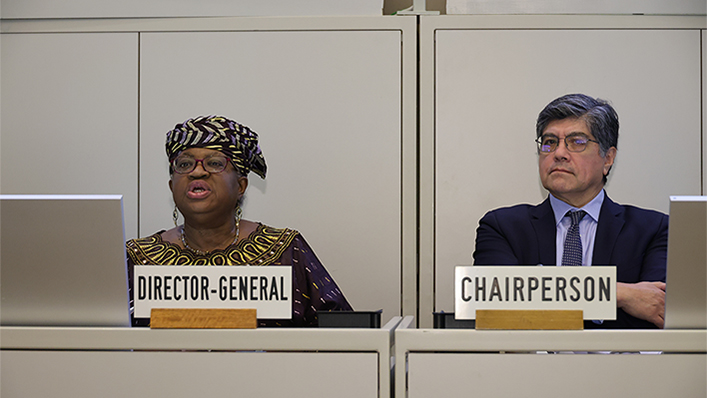
WTO members welcomed the progress made in strengthening the role of the Committee as the main forum for dialogue on trade and environment. The Committee considered several proposals on improving its functioning, including through greater transparency and experience-sharing; the role of technology transfer to address climate change as well as several proposals on trade-related environmental measures. Several members expressed an interest in examining the effects on environmental measures on market access and its impact on developing countries and least-developed countries (LDCs). In this regard, the importance of technical assistance and capacity building was acknowledged.
Members also exchanged ideas on how to present the ongoing efforts on trade and environment to Ministers at MC13. The Chair, Ambassador José Valencia of Ecuador, said that based on his consultations with members, many delegations noted that MC13 offered an opportunity to continue revitalizing the work of the CTE.
Many noted that MC13 preparations should build on the progress made since MC12. A suggestion was made for Ministers at MC13 to take stock of the progress made and to provide guidance on the way forward, including on ways of supporting developing countries and LDCs. Several delegations expressed an interest of having ministerial deliberations on trade and environment measures, as part of the broader efforts of strengthening WTO’s deliberative function.
Ambassador Valencia further noted that the Chair of the General Council, Ambassador Athaliah Lesiba Molokomme of Botswana, intends to convene informal consultations in the coming weeks on the text of the MC13 outcome document and that he will keep coordinating with her on CTE’s inputs.
Thematic session: Trade contributions to energy transition
In the morning before the CTE meeting, members participated in the Committee’s first thematic session, marking an important step in members’ efforts of “reform by doing”. The session titled “Trade contributions to energy transition efforts concerning climate adaptation and mitigation” was moderated by Anna Vitie, deputy permanent representative of Finland. She highlighted that the discussion recognized that ensuring energy transition was a shared priority of the international community and that the multilateral trading system could support the international community in this endeavour.
Speakers made several suggestions on how trade could support the energy transition, ranging from lowering tariffs and non-tariff barriers on environmental goods, to ensuring better data on greenhouse gas emissions and to providing trade-related support and capacity-building, including through Aid for Trade. The role of trade for promoting clean technology supply chains was also acknowledged. Financing availability and the cost of capital were highlighted among the main challenges associated with the energy transition, especially in developing countries with limited fiscal space. It was noted that reducing development risks by improving the business environment and strengthening institutions and infrastructure could positively contribute to addressing those challenges.
The discussion pointed to several trade policy tools that can play a role in the energy transition. These ranged from redoubling efforts in tackling fossil fuel subsidies to promoting clean technology supply chains and to promoting common standards and definitions, including in the steel sector. The role of the WTO as a forum for transparency and dialogue, including on topics of relevance to trade and environment was also acknowledged.
A video recording of the session is available here.
COP28 preparations
Director-General Ngozi Okonjo-Iweala briefed WTO members on the Secretariat preparations for the upcoming 28th Conference of the Parties to the United Nations Framework Convention on Climate Change (COP28) in Dubai. She said she would deliver the message that trade is an important part of the solution to tackling the challenge of climate change and noted that the WTO Secretariat is co-leading with the United Arab Emirates, and in cooperation with the International Chamber of Commerce (ICC), the United Nations Conference on Trade and Development (UNCTAD) and the World Economic Forum (WEF), the first ever “Trade Day” at COP28 on 4 December.
More information about the WTO Secretariat at COP28 and Trade Day events is available here.
Other
The Committee also heard updates on the European Union Green Deal and the Global Biofuels Alliance. Members furthermore were briefed on developments concerning the Dialogue on Plastics Pollution and Environmentally Sustainable Plastics Trade (DPP); the Trade and Environmental Sustainability Structured Discussions (TESSD); and the Fossil Fuels Subsidy Reform initiative, and negotiations on the Agreement on Climate Change, Trade and Sustainability (ACCTS). The Secretariat presented the 2022 update to the WTO Environmental Database and launched, together with the Secretariat of the Basel, Rotterdam and Stockholm Conventions, the new e-learning course titled “The BRS Conventions and the WTO: Enhancing international cooperation for sustainable development.”
The next Committee meeting will be in April 2024.
Share
Reach us to explore global export and import deals